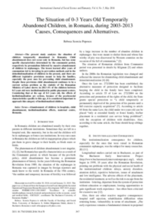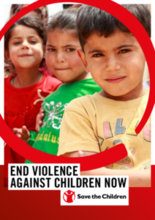Displaying 151 - 160 of 220
This article by Marcus Roberts discusses how and why intercountry adoptions have dropped so dramatically in the recent years.
This study used a secondary analysis of data from 2003 to 2013 to better understand the situation of children temporarily abandoned in Romania. It looked at data for children aged 0-3 years who were abandoned in different hospital units or institutionalized in public orphanages or public and private foster care institutions.
After the fall of the Soviet Union, the world was shocked to learn that countless children were being held in unsanitary and hazardous conditions within Romanian orphanages. This video tells of Izidor Ruckel’s experience while growing up in a Romanian orphanage, along with his eventual immigration to the U.S. where he was adopted by a family from California.
Izidor Ruckel was one of thousands of children found living in terrible conditions in Romanian orphanages after the collapse of the Communist government. This short video from BBC News shares his story.
In this video from the Brainwaves Video Anthology, Dr. Charles Nelson shares some findings from his research on the impacts of deprivation on children's cognitive and brain development through the Bucharest Early Intervention Project.
This article discusses adoption in the international human rights framework. Most specifically, it focuses on the rights of the child and how to proceed with adoptions by keeping in mind the best interest of the child.
Meant to highlight the maxim that every child deserves the best that we all have to give; this book provides a review of the progress made since The UN Convention on the Rights of the Child. It contains reports from 21 countries on the status of the rights of the child. The countries are: Australia, Canada, Croatia, Denmark, France, Germany, Greece, India, Iran, Japan, Portugal, Romania, Scotland, Serbia, Solomon Islands, Spain, the Netherlands, the UK, the USA, Uzbekistan and Venezuela. There are no reports from Africa.
This booklet is based on a recent internal desk review of Save the Children’s and partners’ work against physical and humiliating punishment of children, commissioned by Save the Children Sweden. It aims to present best practices, to show what methods have worked around the world, and to spread knowledge about results achieved and lessons learned when it comes to law reform and positive discipline.
A group of activists who were formerly raised in Romania's communist-era orphanages have created an association called Federeii. The group is pushing Romanian authorities to recognize and apologize for a variety of abuses committed against an estimated 500,000 children in the country's orphanages that existed before the end of the Cold War. The abuse and neglect, including physical and sexual abuse, are discussed in the article.
The Bucharest Early Intervention Project (BEIP) examined the outcomes for children who were originally placed in institutions; these children were randomized into two groups and followed longitudinally, with some being moved into foster care and others remaining in institutional care. This study reports on the brain electrical activity (electroencephalogram, or “EEG”) of 12-year-old children in this study, in order to examine the impact of movement to foster care after early psychological deprivation as a result of institutionalization.



